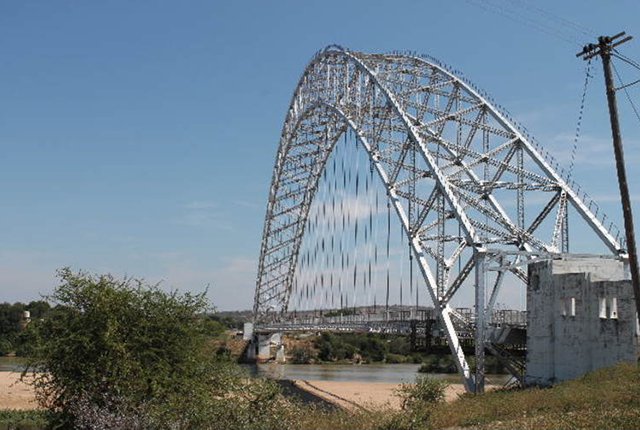New bridge over Save River on the cards

George Maponga in Masvingo
Zimbabwe’s biggest lithium producer, Bikita Minerals, which is owned by Chinese firm, Sinomine, has revealed plans to build a new bridge over the Save River to replace the iconic Birchenough Bridge with an initial US$10 million set aside for the project.
Construction of a new bridge over the Save, Zimbabwe’s biggest inland river, comes in the wake of growing concerns over the state of the 88-year-old Birchenough Bridge.
Birchenough Bridge, which is in Chimanimani District, connects Manicaland Province to Masvingo and was constructed in 1935. It is named after Sir Alfred Birchenough.
The single arch suspension bridge is 329 metres long and at the time of its commissioning, it was the world’s third longest single arch suspension bridge, making it a source of national pride and a tourist attraction.
Plans by Bikita Minerals to build a new bridge to replace Birchenough will be done under the firm’s corporate social responsibility programme and besides providing a vital link between Masvingo and Manicaland provinces, it will also enhance the movement of goods and people from the eastern part of Zimbabwe to South Africa.
Bikita Minerals public relations officer Mr Collen Nikisi disclosed that feasibility studies and designs for a new bridge across Save River were almost complete.
Mr Nikisi further revealed that a team of Chinese civil engineers had recently visited the construction site of the new bridge over Save River.
“The bridge (over Save River) will be built by Bikita Minerals under our corporate social responsibility programme and we have so far set aside a budget of US$10 million for the project that we hope will provide vital economic linkage between Masvingo and Manicaland provinces. The new bridge will also provide safe and secure passage to South Africa and Mozambique,’’ said Mr Nikisi.
“Feasibility studies and designs (of the new bridge) are almost complete and recently a team of Chinese civil engineers visited the construction site (of the new bridge).’’
The lithium miner was now waiting for Government to give it the green light to build the new bridge whose construction dovetails with Government’s Vision 2030 that seeks to create an empowered upper middle income society in Zimbabwe by 2030.
“We have already presented a draft Memorandum of Understanding for the project to Government through the Ministry of Transport and Infrastructural Development,’’ said Mr Nikisi.
Besides plans to build a new bridge over Save River, Bikita Minerals has since its takeover by Sinomine invested hugely in infrastructural development to benefit communities around Zimbabwe’s biggest lithium mine.
The firm also splurged US$500 000 to construct, repair and maintain roads in both Bikita and Gutu districts. Bikita Minerals is located at the border between Gutu and Bikita.
Among some of the roads either repaired or maintained by the lithium miner were Nyika-Kamungoma road, Beardmore-Rusununguko road in Bikita and the Marinda to Makwirivindi road in Gutu.
More than 30 boreholes were also drilled by the company in the two districts to improve access to clean potable water.
In the sphere of health, the lithium miner also donated building materials for the construction for Shumbaimwe clinic in Bikita and Makwirivindi clinic in Chiwara, Gutu.
In a bid to ensure uninterrupted power supply to communities and businesses in Zaka, Gutu and Bikita, Bikita Minerals had also poured funds into the construction of the Zesa Tokwe powerline which is work in progress.
Following the takeover of the lithium miner by Sinomine last year in a US$300 million investment, Bikita Minerals direct employees have risen to nearly 1 100, while contractors carrying out different works at the mine employ a further 1 400 workers.
The company recently announced that exploration results had showed it was sitting on 65 million tonnes of lithium, making it arguably the holder of the biggest proven lithium reserves in Zimbabwe.
This development also cemented Zimbabwe’s position as a top player globally in terms of lithium output as demand for the mineral surges due to its efficacy in ceramics, cell phone making and car batteries.
Bikita Minerals recently announced that it had completed feasibility studies for a lithium smelter within the idea of value addition which means more revenue for the firm and by extension the country.











Comments